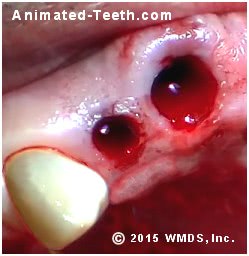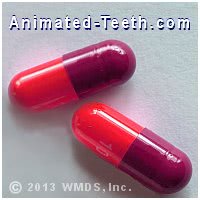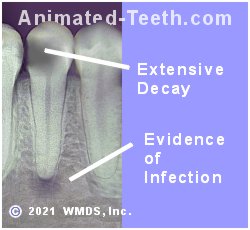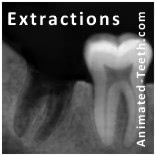Drugs to avoid before a tooth extraction. – Medications & supplements that may cause complications when having a tooth pulled.
Your dentist will need to know all of the medications, OTC products, and health supplements that you take.
Almost all dental patients manage some type of medical condition or issue, no matter how minor, using health supplements or medications (prescription or over-the-counter). However, many people are unaware that taking some kinds of compounds can negatively impact invasive dental procedures, like a tooth extraction, or the healing process that follows.
So, to minimize the potential for complications, before they can even consider pulling your tooth, your dentist will first need to review the list of medications you take.
Your meds list.
Your “meds list” is a complete accounting of all of the medications (prescription and OTC), vitamins, dietary supplements, and herbal compounds that you take, no matter if you think some of them are inconsequential or not.
Your dentist being aware of everything you take before your tooth extraction procedure is performed is of utmost importance because some kinds of compounds have the potential to cause complications during surgery and/or the healing process that follows. In extreme cases, the complications that develop might be life-threatening.
Beware – It may be a compound’s side effects that are the issue of concern.
While you’re probably familiar with the therapeutic benefits of the drugs and supplements you take, you’re probably not so knowledgeable about all of the different side effects and potential drug interactions they may pose.
In many cases, it’s these side effects and interactions that are your dentist’s primary concern when performing your extraction. So be complete, just using your judgment about what’s important isn’t good enough. Report everything you take so nothing gets overlooked and your procedure is performed safely and your risk for complications is kept to a minimum.
FYI: Presenting a complete medical history and comprehensive medicines list to your dentist is vitally important for your safety and well-being and is also your responsibility.
Types of medications and supplements that may unfavorably impact your extraction process and/or extraction site healing.
The remainder of this page discusses the kinds of drugs and supplements that are usually of most concern to a dentist when planning their patient’s tooth extraction.
Keep in mind that no reference list should ever be considered all-inclusive. So, when formulating your meds list for your dentist, don’t be swayed by what compounds we’ve chosen to mention. You still must report everything you take and use (drugs, supplements, etc…) so nothing is overlooked.
Here are the classes of compounds we discuss on this page –
- Prescription blood thinners.
- OTC NSAID pain relievers/anti-inflammatories.
- Prescription NSAID pain relievers/anti-inflammatories.
- Nutritional and herbal supplements.
- Antibiotics.
- Chemotherapy drugs.
- Corticosteroids / Steroids.
- Immunosuppressive drugs.
- Bisphosphonates.
- Viagra / Cialis.
- Drug interactions.
Should you stop taking these drugs or supplements before your extraction?
The answer is no. A decision about what medications are important for you to take is one that only your dentist and physician can make. Stopping the use of a medication on your own may lead to serious, possibly life-threatening, health complications.
It’s vital for you to report all of the compounds that you take (prescription drugs, doctor-recommended OTC products, and self-prescribed compounds). But it’s the role of your healthcare providers to determine how their use may need to be modified in regard to your pending tooth extraction.
1) Prescription anticoagulants / blood thinners.
This class of medication is taken specifically for its inhibitory effect on the blood clotting process. And for obvious reasons, its use needs to be avoided or managed prior to having an invasive dental procedure performed like having a tooth extracted.

Being able to control bleeding following a dental extraction is vital.
a) Prescription blood thinners –
Risk: Causes an inhibitory effect on blood clotting.
Examples include:
heparin/low molecular weight heparin (Ardeparin, Dalteparin, Enoxaparin), warfarin (Coumadin), apixaban (Eliquis), rivaroxaban (Xarelto), dabigatran (Pradaxa)
b) Prescription antiplatelet medications –
Risk: Causes an inhibitory effect on blood clotting.
Examples include:
clopidogrel (Plavix), ticlopidine (Ticlid), abciximab (ReoPro), eptifibatide (Integrilin)
How prescription medications that have a blood-thinning effect may be managed prior to having oral surgery.
Depending on the type of hematological therapy you require, two different approaches are frequently used.
- If pausing the use of the drug is possible, your dentist will provide instructions for discontinuing the medication for a few days to a week or more prior to your extraction appointment. You’ll then resume its use following your procedure.
- In cases where the continued use of the drug is needed without interruption …
1) Your case may be treatment planned in a fashion where a fewer number of teeth are pulled per appointment. Doing so is a way of limiting the extent of the wound that’s created which makes controlling its bleeding more manageable.
2) Additional post-extraction measures are typically implemented (such as the use of clotting aids What are these? ) that can help to ensure that the patient’s postoperative bleeding is more readily controlled.
- It’s customary that your dentist will consult with your physician when formulating the plan that’s used for your treatment.
▲ Section references – Koerner
Unilaterally deciding to stop taking anticoagulant medication before your tooth extraction could be dangerous.
It’s important to understand that blood-thinning agents (anticoagulants, antiplatelet agents, etc…) are characteristically given as continuous therapy. They’re intended to provide a sustained effect. One that provides continuous protection against serious health events occurring.
It’s never appropriate for a patient to stop the use of these medications without first consulting with a qualified medical professional.
Important but unrealized side effects of medications and dietary supplements.
The drugs mentioned above are characteristically taken for their blood-thinning effect. And it would be rare that a person taking one of them wasn’t at least minimally aware of this fact and had an understanding that this information would be of importance to their dentist before pulling any of their teeth.
Less well-known but important side effects.
In comparison, the next several groups of medications, supplements, vitamins, and herbal compounds we discuss are likely taken for different therapeutic reasons. Their inhibitory effect on the blood clotting process is generally considered a side effect and therefore an important factor that the person taking the agent may not be aware of.
Your dentist’s concern isn’t only about excessive blood loss during or following your surgical procedure. Your body’s ability to form a blood clot in your tooth’s socket plays an important role in the post-extraction healing process Here’s how. and if an adequate one can’t form, complications will occur.
2) NSAID pain relievers / anti-inflammatories. –
Risk: Produces an inhibitory effect on blood clotting.
i) Examples of over-the-counter (OTC) NSAID products include:
aspirin (including baby aspirin), ibuprofen (Advil, Motrin), naproxen (Aleve)
These kinds of medications may be items that you can avoid using before having your tooth extraction.
- People frequently take OTC NSAIDs (aspirin, ibuprofen, naproxen, etc…) on a self-prescribed, transient basis as a means of controlling minor discomfort (headache, tooth pain) or for their anti-inflammatory effect (minor joint pain, muscle soreness).
If so, optionally ceasing their use for some days before your surgery can remove them as a concern with your extraction procedure.
(Your dentist will need to specify the required time period because its duration varies with different drugs and the dentist’s opinion. Examples: Aspirin cessation as many as 10 days. Ibuprofen cessation as few as 2 to 3 days.)
- It’s also important to state that there are multiple factors that a dentist will need to consider when determining if their patient is at increased risk of bleeding complications due to their use of OTC NSAID compounds, either transient or therapeutic regimens.
A simple phone call to your dentist’s office in advance of your extraction appointment can clarify what action if any you should take.
ii) Examples of prescription NSAID drugs include:
diclofenac (Zorvolex), indomethacin (Indocin)
These may be medications that you can avoid using before having your tooth extraction.
- In cases where you take a prescription NSAID on a self-regulated, transient basis, optionally ceasing its use for some days before your surgery can remove its use as a concern with your extraction procedure.
(Your dentist will need to provide you with specific instructions because the duration varies with different drugs as well as the dentist’s opinion. Examples: Diclofenac cessation as few as 2 to 3 days.)
- It’s also important to state that there are multiple factors that a dentist must consider when determining if their patient is at high risk of bleeding complications due to their use of prescription NSAID compounds, both transient and therapeutic regimens.
A simple phone call to your dentist’s office in advance of your extraction appointment can clarify what action if any you should take.
▲ Section references – Koerner
Can you take any painkillers before a tooth extraction?
Obviously, people suffering from toothache will be desperate to take some type of analgesic as a means of finding relief. However, how doing so will need to disrupt the timing of your extraction can only be determined by your dentist.
Generally speaking, for over-the-counter options, acetaminophen (Tylenol), when found to be effective, makes the best (least complicating) choice. Ibuprofen (Advil, Motrin) may be found to be a more effective pain reliever but does have the associated drawbacks discussed above. Most dentists would probably consider taking aspirin to be the least favorable option.
If consulted (possibly by phone), your dentist may decide that it is appropriate for them to prescribe a narcotic pain reliever for you that’s both more effective than what’s available to you on an OTC basis and will not produce unwanted side effects that will complicate having your extraction.
3) Dietary, nutritional, and herbal supplements.
Risk: Produces an inhibitory effect on blood clotting.
Examples of dietary and herbal supplements that may increase bleeding risks:
Vitamins to avoid before a tooth extraction.
Vitamin E, Multivitamins
Dietary and Herbal supplements to avoid before a tooth extraction.
Fish oil (omegas), Garlic, Cayenne (chili pepper), Ginger, Ginseng, Ginkgo biloba, Feverfew, Chamomile, Bilberry, Danshen, Dong Quai, Golden Seal, Red Clover, Turmeric, CBD oil
Supplements may be items that you can avoid using before having your tooth extraction.
- Ideally, a recommendation about the process of ceasing the use of nutritional or herbal supplements would come from the medical professional who made the original recommendation for their use. Unfortunately, the unregulated, self-prescribed nature of many people’s usage makes this type of authority unavailable.
A phone call to your dentist’s office in advance of your extraction appointment may clarify what action if any you should take.
▲ Section references – Koerner
4) Antibiotics.
Risk: May produce an inhibitory effect on blood clotting.
Vitamin K is a compound that plays an important role in the blood clotting process. A person’s level of vitamin K may be reduced due to the effect of broad-spectrum antibiotics on intestinal bacteria. The potential for this effect is most associated with (NMTT side chain) cephalosporin antibiotics and/or prolonged antibiotic use.
Examples of NMTT cephalosporins include:
Unilaterally deciding to cease the use of antibiotics before a tooth extraction could be dangerous.
No patient should decide to discontinue the use of an antibiotic on their own. Instead, their dentist and physician must determine how their need for an extraction is best managed in light of their antibiotic therapy history.

5) Chemotherapy drugs.
Risk: Produces an inhibitory effect on blood clotting.
The use of chemotherapy drugs may reduce the patient’s level of platelets. These tiny fragments of cells circulate in your bloodstream and are instrumental in initiating clot formation.
Note: The use of bisphosphonate drugs creates additional concerns with tooth extractions. (Topic discussed below.)
Can you get a tooth pulled while having chemotherapy?
This can only be decided on a case-by-case basis. Important factors include what drugs have been used and in what dosage.
- Ideally, all foreseen dental treatment will be completed before the patient’s chemotherapy is begun. This frequently includes the elimination of infectious foci (like extracting infected teeth).
- During the patient’s chemotherapy, dental treatment should be limited to emergency procedures only. Consultation with the patient’s physician is needed.
- Dental treatment can be resumed after chemotherapy, with special precautions taken for patients who have received bisphosphonate drugs as a part of their chemotherapy (see discussion below).

An infected tooth slated for extraction.
Unilaterally deciding to cease the use of chemotherapy medications before a tooth extraction could be dangerous.
▲ Section references – Koerner
6) Corticosteroids / Steroids.
Patients who take corticosteroids, including self-prescribed anabolic steroids, can be at higher risk for experiencing acute adrenal insufficiency during periods of stress, like that which is often involved with tooth extraction procedures.
This medical emergency is caused by a lack of cortisol production due to adrenal gland suppression and/or atrophy caused by the long-term use of corticosteroids.
- In cases where the patient has a history of steroid use, the patient’s extraction should be managed so the level of stress and anxiety they experience is kept to a minimum.
- After consultation with the patient’s medical doctor, it may be decided that steroid supplementation prior to the patient’s surgical procedure is indicated so their body is able to adequately respond to the stress that’s frequently associated with it.
Hydrocortisone/Solu-Cortef is frequently the supplement that’s given. With especially difficult or extended surgeries, administration of an additional quantity of supplementary steroids may be needed some hours following the procedure.
Examples of corticosteroids include:
▲ Section references – Hupp, Fragiskos
Unilaterally deciding to stop the use of corticosteroid medications before a tooth extraction could be dangerous.
No patient should decide to abruptly discontinue the use of corticosteroids without consulting with their physician. Sudden withdrawal can lead to serious symptoms such as severe fatigue, weakness, body aches, and episodes of acute adrenal insufficiency. It may take as long as 12 months for adrenal gland function to return to normal.
Instead, the patient, their dentist, and physician must determine how their need for an extraction is best managed in light of their usage history.
7) Immunosuppressive drugs.
Examples of immunosuppressive drugs include:
▲ Section references – Hupp
Unilaterally deciding to stop the use of immunosuppressive medications before a tooth extraction could be dangerous.
No patient should decide to discontinue the use of immunosuppressive drugs on their own. Instead, their dentist and physician must determine how their need for an extraction is best managed in light of their therapy history.
8) Bisphosphonate medications (antiresorptive drugs).
Bisphosphonates are a class of drugs that are used to treat cancers that have metastasized (spread) to bone, osteoporosis (prevention and treatment), osteopenia, Paget’s disease, and multiple myeloma.
A history of taking bisphosphonates, even a somewhat distant one, can place oral surgery patients at risk for developing a bone-healing complication termed “medication-related osteonecrosis of the jaw”, abbreviated as MRONJ.
This is a serious postoperative complication that’s challenging to treat and can cause significant adverse effects on a person’s quality of life. This includes chronic pain, development of infection, progressive destruction of the jawbone, dysfunction, and disfigurement.
Postoperative x-ray of an extraction site.

The area of bone that needs to fill in during the healing process is obvious.
Examples of bisphosphonate drugs include:
alendronate (Fosamax), ibandronate (Boniva), risedronate (Actonel), zoledronic acid (Reclast, Aclasta, Zometa), etidronate (Didronel), pamidronate (Aredia), tiludronate (Skelid)
Additionally, the medication denosumab (such as Prolia and Xgeva) and antiangiogenic agents (such as Bevacizumab and Sunitinib) have also been associated with the development of MRONJ.
▲ Section references – Kalra, Sambrook
Unilaterally deciding to stop the use of bisphosphonate medications before a tooth extraction is ill-advised.
No patient should decide to discontinue the use of bisphosphonate agents on their own. Instead, their dentist and physician must determine how their need for an extraction is best managed in light of their therapy history.
A patient’s level of risk varies according to the drug used, its dosage, method of administration (IV vs. oral), and its duration of use. In all cases, the patient must make sure their dentist is aware of their exposure so an adequate evaluation of their risk can be made.
9) Viagra (sildenafil) / Cialis (tadalafil).
Before a tooth extraction.
There are concerns with taking sildenafil (Viagra) or tadalafil (Cialis) before (even some days before) having surgery where general anesthesia is used. But most dental extractions don’t take place under these conditions.
Extractions, including even most wisdom tooth extractions, are usually performed using local anesthesia and sometimes an added sedative. (Details about Dental Conscious Sedation.) However, you should always mention Viagra or Cialis use to your dentist so they can pass judgment on your situation in light of your upcoming oral surgery.
What about taking Viagra after a tooth extraction?
A study by Orchard (2017) determined that sildenafil (Viagra) usage tended to delay early bone healing of tooth sockets. However, this paper found that by day 8 postop this transient effect caused no appreciable differences between the test and control groups.
However, as a way of idealizing the postextraction healing process and its outcome, the study’s authors suggested that the drug (Viagra) should be avoided in the immediate days following a tooth extraction (day of surgery and the following week).
▲ Section references – Orchard
10) Drug interactions.
One or more of the medications, herbal compounds, or dietary supplements that you take may interact with some of the drugs your dentist frequently uses when perform a tooth extraction. This interaction may amplify or reduce their standard or expected effect with potentially significant, possibly life-threatening, consequences. Additionally, drug toxicity is possible.
The interaction may occur with compounds used prior to, during, or following a person’s extraction procedure. The effects encountered can include:
- Drug interactions that inhibit blood clotting.
- Interactions that result in oversedation of the patient or respiratory depression.
- Interactivity that causes changes in blood pressure levels or cardiac function.
- Interactions that result in drug toxicity.
- A loss of the antibacterial effect of antibiotics.
Your defense is presenting a complete meds list.
It would be impossible to formulate a list of all of the different compounds that have the potential to cause some type of interaction with the drugs your dentist normally uses when performing extractions.
However, all that’s needed to keep you safe is your providing your dentist with a complete meds list (including all of the medications, dietary supplements, vitamins, and herbal compounds that you take, both prescription and OTC).
What’s next?
We have more information about extraction planning.
Page references sources:
Fragiskos FD. Oral Surgery. (Chapter: Medical History)
Hupp J, et al. Contemporary Oral and Maxillofacial Surgery. Chapter: Principles of Management of Impacted Teeth.
Kalra S, et al. Dental complications and management of patients on bisphosphonate therapy: A review article.
Koerner KR. Manual of Minor Oral Surgery for the General Dentist. (Chapter: Surgical Extractions)
Nakano E, et al. A Case of Alveolar Bleeding from Clotting Abnormality by Cefmetazole.
Orchard E, et al. Sildenafil Transiently Delays Early Alveolar Healing of Tooth Extraction Sockets.
Patton L, et al. The ADA practical guide to patients with medical conditions.
Sambrook PJ, et al. Contemporary exodontia.
All reference sources for topic Tooth Extractions.
